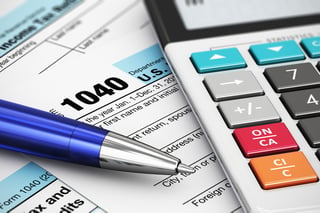
Each year, the federal government collects over $3 trillion in individual income taxes. Some people may think that’s because taxes are so high. That probably has something to do with it. The country’s high voluntary compliance rate (82 percent) may have even more to do with it.
But it’s not all good news. A lot of money, some $320 billion according to the IRS, goes uncollected. The Service states that the main problems are underreported income, underpayment of taxes, and nonfiling. The IRS has a lot of resources with which to collect this money. Even in the downsized IRS, there are agents and accountants whose sole job responsibility is collecting that unpaid tax. These individuals have a lot of tools at their disposal. In most cases, the IRS does not need a court order to garnish wages, file property liens, or even garnish bank accounts.
A Minnesota bankruptcy does not automatically wipe out all tax debt. But either a Chapter 7 or Chapter 13 will take care of a good chunk of it.
Tax Debt and the Automatic Stay
Many laws at both the federal and state level regulate debt collectors. These laws set limits on what they can or cannot do. Many of these laws do not apply to government-related debts, such as taxes.
But Section 362 of the Bankruptcy Code is one of the exceptions. This provision applies to both public and private debts, whether they are dischargeable or not. So, bankruptcy may be the only way to stop aggressive IRS tax collection techniques, such as:
- Wage garnishment,
- Asset seizure,
- Account garnishment, and
- Collection notices.
Sometimes the IRS voluntarily agrees to forgo such activity if the taxpayer attempts to work out a payment plan or takes some similar steps. But these promises are not written in stone. The bankruptcy automatic stay, on the other hand, is a separate federal law. The penalties for violating it are quite stiff. The IRS knows this, which is why the IRS immediately backs off the account if the taxpayer files a bankruptcy case.
A Minnesota Bankruptcy and Tax Debt Discharge
Federal and state taxes are unsecured debts. Although the IRS can attach property to satisfy a debt, there is no security agreement. In that respect, unpaid income taxes are like credit cards, medical bills, and other types of dischargeable unsecured debt.
But legally taxes are more like alimony and child support. These debts are not dischargeable under any circumstances, even though they are clearly unsecured. The rule regarding Minnesota bankruptcy and tax debt discharge is not quite as strict. These obligations are dischargeable if:
- Income Tax: Trust fund taxes and other non-income tax obligations, such as withholding and sales taxes are not dischargeable. So, if a taxpayer owes both, only the part of the debt attributable to income tax is dischargeable in bankruptcy. However, the automatic stay applies to both income tax and other debts.
- Three Years: The due date for the income tax return must be at least three years before the date the bankruptcy case is filed. Keep in mind that Tax Day is not always on April 15 of every year. The due date may also be different if the taxpayer received a filing extension. These items may seem insignificant, but the IRS has been known to challenge discharge if the petition was just a few days too early.
- Two Years: The returns must have been on file for at least two years. They must be taxpayer-filed returns. If the person does not file, the IRS prepares substitute returns. But these documents do not count for bankruptcy purposes.
- 240 Days: This is the rule which trips up lots of people in Minneapolis. If the IRS has assessed the debt less than 240 days prior to the bankruptcy filing, the debt is not dischargeable. “Assessment” is basically an internal accounting procedure. But generally, if the taxpayer has not received a statement in the last eight months, the debt has probably not been assessed in the last 240 days.
The same rules apply to Minnesota Department of Revenue past-due tax.
A Minnesota bankruptcy wipes out tax debt if the obligation meets the above requirements. However, bankruptcy does not eliminate the collateral consequences of this debt. In this context, that usually means tax liens. The Minnesota bankruptcy judge has the power to discharge the obligation. But the judge does not have the power to extinguish the liens. If the IRS has taken this action, you’ll need to negotiate with the Service separately on that matter.
Some Non-Bankruptcy Alternatives
Speaking of separate procedures, there may me some non-bankruptcy alternatives to satisfy unpaid tax debt. Given the relatively restrictive discharge rules, many of our clients might entertain one of these options. Some alternatives include:
- Installment Agreement: Most taxpayers qualify for a payment plan. In general, the IRS accepts most proposals which pay off the entire amount before the collection statute of limitations expires. Not all installment agreements are created equally, so it’s important to consult an attorney.
- Offer in Compromise: Those tax-relief firms which claim to satisfy your tax debt for “pennies on the dollar” are talking about an offer in compromise. If you qualify, it’s possible to do just that. But not surprisingly, not everyone qualifies for this kind of relief.
- Innocent Spouse: In many households, one spouse controls all the financial matters and the other spouse simply signs the return. If that’s the case in your Minneapolis household, you may qualify for this kind of relief.
Sometimes we handle these IRS matters in-house. But if your case is particularly complex, we will refer you to a tax defense attorney in Minnesota.
In many cases, a Minnesota bankruptcy wipes out income tax debt. For a free consultation with an experienced bankruptcy attorney in Minneapolis, contact Kain & Scott. We provide a free credit repair service to our clients.



